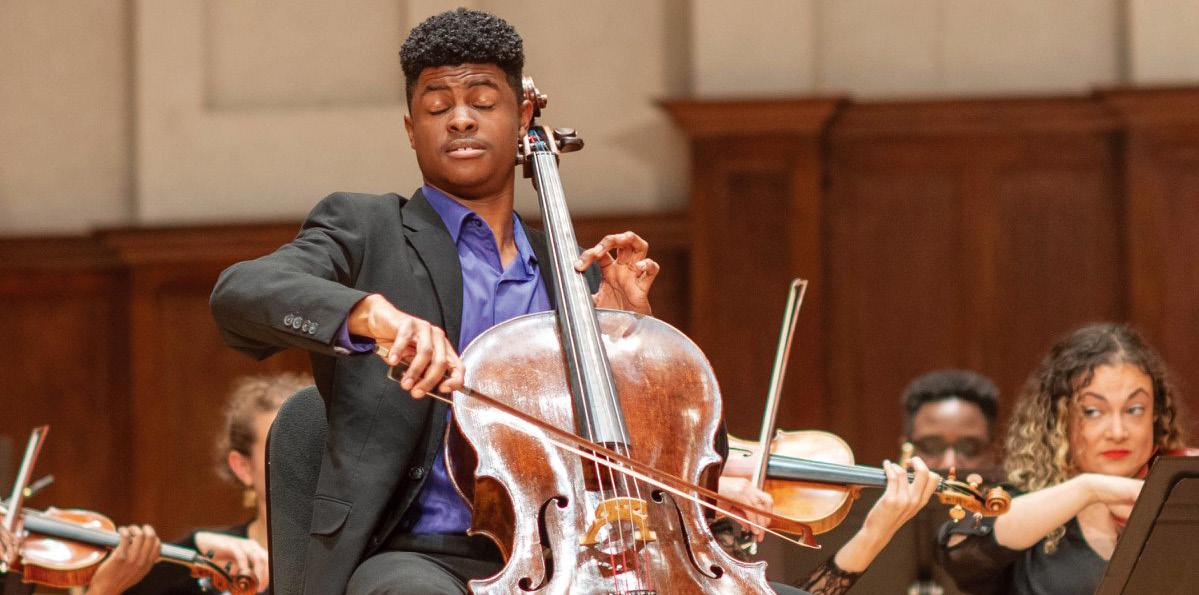
3 minute read
Coda
The Virtual Violin
Ray Chen isn’t your standard violin virtuoso. Sure, he entered the Curtis Institute of Music at age 15, aced international competitions, makes acclaimed recordings, and performs with some of the world’s leading orchestras. But the Taipei-born musician, age 32, has carved out a distinctive profile with a longstanding embrace of social media: his YouTube videos have racked up millions of views; he’s all over Instagram and Twitter; if there’s a digital platform where he hasn’t played, it probably hasn’t been invented yet. Using social media, Chen aims to make classical music more accessible, more … well, relatable— and still brilliant. Here, Chen writes about how his latest digital project expanded his idea of what a musical community can be by creating a virtual space to help musicians connect while maintaining practice and high skill levels during the pandemic.
In February of 2019, I had the opportunity to collaborate with the Los Angeles Philharmonic on a competition project. We invited talented amateur violinists to play the first movement of Bach’s Concerto for Two Violins in D Minor and apply to win an invitation to perform at the Hollywood Bowl. Submissions steadily trickled in, but the floodgates truly opened on March 22, 2019, after I posted a video on the usual social-media platforms in which I spoke to potential applicants from backstage at the LA Phil. Within weeks, we had millions of views and over 800 applications from 72 countries. We expanded our global footprint, connected with younger audiences, and built a community beyond the typical concertgoer.
Having a direct line of communication to your existing—and potential—listeners to share a personal and undiluted message is more revolutionary than it may seem. The rise of the social-forward internet has enabled artists, orchestras, and concert halls to regularly share and excite audiences about their amazing projects and collaborations. From ticket sales to merchandise, fan events and global fundraising initiatives, the opportunities that social media has brought my partners and me have been unprecedented. The power of the social internet never ceases to amaze me, and though it may be an unorthodox opinion, I believe it will pave the path forward for classical music to better reach and inspire audiences, old and new.
In every project I take on, I seek to combine three key elements: performance, education, and community. The biggest challenge I’ve encountered has been building a sustainable combination. This is a universal issue, familiar to every content creator and artist. The existing media platforms are motivated and structured in ways that require us to constantly post content that can compete with “general entertainment.” But to me, classical music is closer to education and community than to entertainment. The path to greatness in the performing arts never ends, but the journey is arguably more valuable than the result. No musician, professional or otherwise, considers themselves “finally good enough”—it would be akin to complacency. Musicians are lifelong learners, and the spaces in which we thrive most
The power of the social internet never ceases to amaze me. I believe it will pave the path for classical music to better reach and inspire audiences, old and new. In every project I take on, I seek to combine three key elements: performance, education, and community.
are those that enable education at every level.
Pocket Conservatory, which my colleagues and I launched during the pandemic in 2021, allows musicians to stream their live audio while they’re practicing, rehearsing, or workshopping new material. We had initially conceived of Pocket Conservatory in 2021 as a space focused on connecting music students with worldclass instructors for online masterclasses that would inspire them to continue improving. As the project evolved, we found that the community that formed on the free app was more powerful than the classes themselves; it alleviated the loneliness of practicing on your own in the constant grind to improve. It made that solitary climb to the top into a hike with friends.
Pocket Conservatory has become a space for musicians of any level to connect with one another, share practice, and track progress. Bringing them all together has made the future of the industry brighter and more diverse. It’s our duty to change with the times and help build that foundation wherever we can.
520 8TH AVENUE, SUITE 2005, 20TH FLOOR, NEW YORK NY 10018-4167











